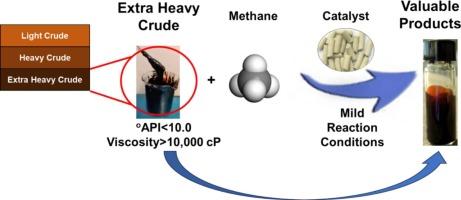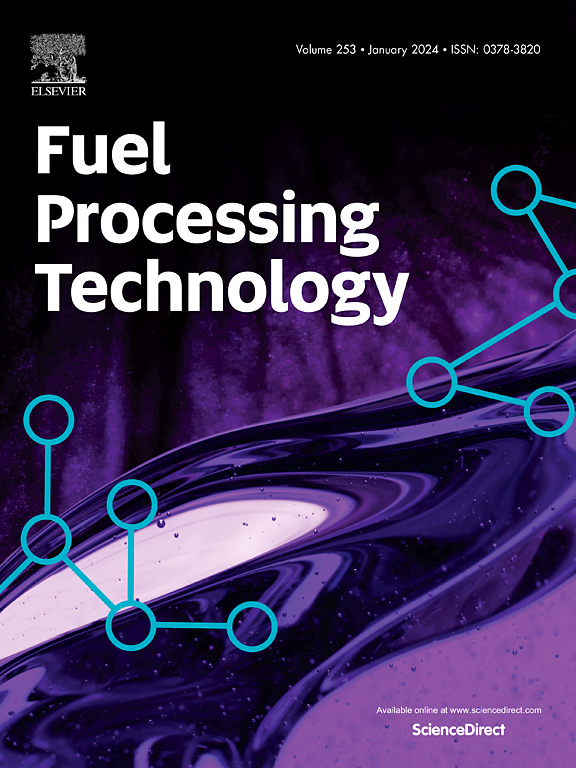Pilot-scale study of methane-assisted catalytic bitumen partial upgrading
IF 7.2
2区 工程技术
Q1 CHEMISTRY, APPLIED
引用次数: 0
Abstract
The direct utilization of heavy and extra-heavy crude oils presents a formidable challenge due to their inherent physical and chemical properties such as high C/H ratio, extremely high viscosity and density, low APIo, super low mobility, high asphaltene and impurity (Fe, Ni, Co, S, N, etc.) contents. To tackle these problems cost-effectively, we have proposed and established a novel technique, distinct from conventional hydrotreating, for catalytic partial upgrading of extra heavy crudes with co-fed methane and a multi-functional catalyst. This technique has been further optimized using lab-scale batch reactors (100 mL, 300 mL), bench-scale and pilot-scale fixed bed reactors with their processing capacity of 250 mL/day and 20 L/day, respectively. The feasibility, stability, and profitability of this technique have been successfully verified using all these facilities and a wide variety of feedstock. Yet, further scale-up is necessary to advance this technique towards commercialization in industry. In this study, a pilot-scale prototype unit (processing capacity of 1 barrel/day) was designed and manufactured based upon the previous achievements, and a bitumen sample recovered from the Steam Assisted Gravity Drainage (SAGD) process was chosen as a typical extra heavy crude for the upgrading. A 30-day upgrading has been conducted smoothly without clogging and a liquid yield of 96.7 % was observed with remarkable enhancements in product quality. The notable decreases in density, viscosity, TAN, asphaltene content, and sulfur content were confirmed and consistent with previous results. A low olefin content implies excellent stability and compatibility of the liquid product. Additionally, a preliminary TEA (Techno-Economic Assessment) and LCA (Life-Cycle Analysis) have been conducted and the beneficial features of this novel technique have been confirmed with higher profitability, lower cost, and lower carbon footprint. This study further consolidates the advantages of this promising technique as a cost-effective and environmentally friendly alternative to hydrotreating for processing extra heavy crudes.

甲烷辅助催化沥青部分提质试验研究
由于重质原油和超重质原油固有的物理和化学特性,如高 C/H 比、极高的粘度和密度、低 APIo、超低流动性、高沥青质和杂质(铁、镍、钴、硫、氮等)含量,直接利用重质原油和超重质原油是一项艰巨的挑战。为了经济有效地解决这些问题,我们提出并建立了一种有别于传统加氢处理的新技术,即使用甲烷和多功能催化剂对特重原油进行催化部分升级。我们使用实验室规模的间歇反应器(100 mL、300 mL)、工作台规模和中试规模的固定床反应器(处理能力分别为 250 mL/天和 20 L/天)对该技术进行了进一步优化。利用所有这些设备和各种原料,已成功验证了该技术的可行性、稳定性和盈利能力。然而,要将这项技术推向工业商业化,还需要进一步扩大规模。在本研究中,根据先前的成果设计并制造了一个中试规模的原型装置(处理能力为 1 桶/天),并选择了从蒸汽辅助重力泄油(SAGD)工艺中回收的沥青样品作为典型的超重原油进行升级。30 天的提质过程顺利进行,没有出现堵塞现象,液体收率达到 96.7%,产品质量显著提高。密度、粘度、TAN、沥青质含量和硫含量的显著下降得到了证实,并与之前的结果保持一致。烯烃含量低意味着液体产品具有出色的稳定性和兼容性。此外,还进行了初步的技术经济评估(TEA)和生命周期分析(LCA),证实了这一新型技术的有利特性,即更高的盈利能力、更低的成本和更少的碳足迹。这项研究进一步巩固了这一前景广阔的技术作为加氢处理超重原油的成本效益型和环境友好型替代技术的优势。
本文章由计算机程序翻译,如有差异,请以英文原文为准。
求助全文
约1分钟内获得全文
求助全文
来源期刊

Fuel Processing Technology
工程技术-工程:化工
CiteScore
13.20
自引率
9.30%
发文量
398
审稿时长
26 days
期刊介绍:
Fuel Processing Technology (FPT) deals with the scientific and technological aspects of converting fossil and renewable resources to clean fuels, value-added chemicals, fuel-related advanced carbon materials and by-products. In addition to the traditional non-nuclear fossil fuels, biomass and wastes, papers on the integration of renewables such as solar and wind energy and energy storage into the fuel processing processes, as well as papers on the production and conversion of non-carbon-containing fuels such as hydrogen and ammonia, are also welcome. While chemical conversion is emphasized, papers on advanced physical conversion processes are also considered for publication in FPT. Papers on the fundamental aspects of fuel structure and properties will also be considered.
 求助内容:
求助内容: 应助结果提醒方式:
应助结果提醒方式:


